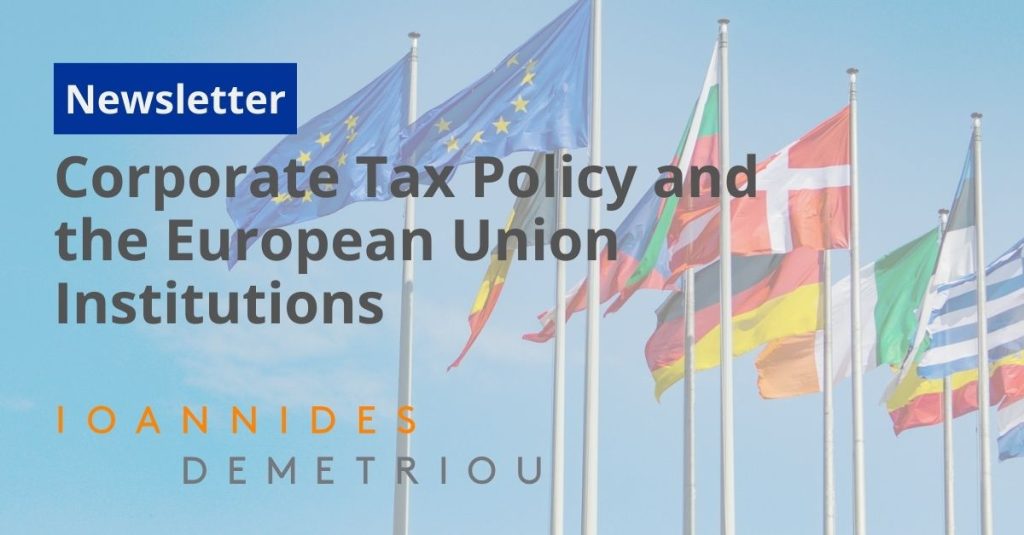
On the 9th of June 2024, Cyprus and other Member States elected their representatives to the European Parliament. This is the only institution of the European Union whose members are directly elected from the people. Nevertheless, this is also one of the institutions with limited powers in many areas. As far as taxation is concerned, the European Parliament has no role whatsoever in the legislative process. This is rather ironic, given the general political slogan of ‘no taxation without representation’.
But which institution makes tax policy in the European Union? The answer is not very straightforward and requires a basic understanding of institutional dynamics in the European Union and competences.
The most important institutions in the European Union are the European Commission, the Council of the European Union, the European Parliament, the European Council and the Court of Justice of the European Union. The legal system of the European Union, as underpinned by the Treaty on the European Union and the Treaty on the Functioning of the European Union, empowers these institutions to participate in the law-making process but only when such power has been so conferred under EU law. In other words, different institutions have different law-making powers, and can only act within the scope of these powers (i.e. competences).
The European Commission is the quasi-executive body of the European Union which proposes laws and manages and implements EU policies. In the field of competition law, it also has some judicial functions. There are 27 Commissioners – one from each Member State. The Commissioners are not directly elected but they are appointed by the government of each Member State. However, once appointed, they are not supposed to represent their Member State. Rather, they take on a portfolio of a policy area and assisted by the relevant directorates-general, they exercise leadership in that area. As far as taxation is concerned, the relevant portfolio is that of ‘economy’ and it is assisted by the DG-TAXUD.
The Council of the European Union is the institution which represents Member State governments in different configurations. The configuration relevant for taxation is the Economic and Financial Affairs Council (ECOFIN) configuration, which is made up of the economic and finance ministers from all Member States. It is in the ECOFIN meetings that the Commission tax proposals are considered and voted upon. The Presidency of the Council rotates among Member States every six months.
The European Council is the EU institution that defines the general political direction and priorities of the European Union. The members of the European Council are the heads of state or government of the 27 EU member states, the European Council President and the President of the European Commission. It has bi-annual meetings, usually at the end of each Council presidency.
The European Parliament comprises of the Members of the European Parliament, which are directly elected by voters in each Member State. Although usually parliaments are legislative bodies, the European Parliament’s powers are rather limited and circumscribed. In the adoption of legislative acts, a distinction is made between the ordinary legislative procedure (co-decision), whereby the European Parliament is on an equal footing with the Council, and the special legislative procedures, which applies only in specific cases where Parliament has a consultative role only. In certain areas such as taxation the European Parliament can only ever give an advisory opinion.
The Court of Justice of the European Union is the judiciary of the European Union and is considered to be the guardian of the Treaties. The judges of the Court of Justice are appointed by Member States though again, not to represent the Member States, but to apply and interpret EU law in the spirit of the acquis communaitaire.
As mentioned above, each institution can only exercise law-making powers only to the extent that it has competence to do so – this is EU competence. Broadly, EU competence can be exclusive or shared. Where the EU does not have any competence, then this area has remained within the exclusive powers of Member States.
Trade policy and trade law is an exclusive competence of the European Union. This means that only the European Union (through the relevant institution(s)) can legislate on trade matters and conclude trade agreements with third countries. A Member State cannot enter into its own trade agreements with other countries, nor deviate from the EU’s trade rules. This was one of the thorny issues under the Brexit negotiations: the UK was not able to negotiate trade agreements with third countries until it left the EU. That is why there was a brief transition period following the UK’s departure from the EU during which period it still benefitted from the EU’s trade agreements with third countries.
There can also be shared competence, where both the EU and Member States can legislate. Examples of shared competence are the internal market, environment and consumer protection.
As far as corporate taxation is concerned, the EU has no competence whatsoever. This remains within the powers of Member States. Nevertheless, even in areas where the EU has no competence, sometimes, the EU legislates by using what I call ‘proxy’ legal bases under the Treaty. More characteristically, in the area of taxation, general (i.e. non-tax specific) Treaty provisions have been used to propose tax legislation, such as Art 115 of the Treaty on the Functioning of the European Union. Pursuant to this Article, the Commission can propose directives in any area it does not have competence (e.g. taxation) on the basis that this is necessary for the establishment or functioning of the internal market. This Treaty provision stipulates that for these proposals to become law, they must be approved by all Member States in Council. This unanimity requirement often makes it very difficult for any tax proposal to go through, as even one Member State can veto the proposal.
A distinction should be made between direct taxation (which includes corporate taxation and the taxation of individuals) and indirect taxation (which includes VAT, customs & excise taxes, etc). The latter area is largely harmonized. It should be pointed out that the Treaty provision which enables the harmonization of indirect taxes (Art 113 of the Treaty on the Functioning of the European Union) also requires unanimity in Council. However, from the early stages of the European Union, there has always been more willingness by Member States to harmonise these taxes compared to direct taxes, which are thought of as more closely aligned with sovereignty.
In any case, due to the lack of competences and the use of general Treaty proxy bases, the Commission and the Council are effectively the only EU institutions that have a meaningful role in the development of direct tax policy. This can be problematic if it is a controversial proposal, which does not enjoy the support of all Member States. It can take years for such proposal to go through, if at all. Even if it does go through, the amendments made to appease some Member States may significantly water down the approved legislation or render it incoherent.
Let us take as an example the proposal for a Financial Transaction Tax. This was first proposed in 2011 but has never been approved. There was an attempt to bypass the unanimity requirement by proposing to introduce a Directive through enhanced cooperation (i.e. only to bind the Member States agreeing to it) but again, this has not been successful. Up until recently, a draft Directive on a Financial Transaction Tax featured in the agenda of ECOFIN meetings but it seems to have faded away.
A more recent example of a proposal which faced opposition in Council but this time eventually got through is the Directive on Minimum Effective Tax Rate. This was originally proposed in December 2021, with the expectation that it would be transposed into the domestic law of Member States by 1 January 2023. However, from the beginning Member States voiced concerns and asked for the delayed implementation of it (mostly, Estonia, Hungary and Poland). Two subsequent revised compromise texts were rejected at ECOFIN meetings in March and April 2022. Whilst many had written off this draft Directive, rather surprisingly, unanimity was achieved in Council (at an ECOFIN meeting) in December 2022 and the Directive was eventually approved.
One could argue that the power of the fiscal veto protects some of the smaller Member States from being forced into unwanted tax harmonization. However, experience from recent years suggests that apart from some Member States in the eastern bloc, smaller Member States such as Cyprus, Malta, Ireland, Luxembourg are unlikely to veto tax proposals. The fiscal veto is more effectively used by the larger Member States to block a proposal. For example, the UK’s objections to the proposed Financial Transaction Tax were one of the reasons that the proposal never went very far. It was feared that with the UK’s departure from the European Union there would be a power vacuum and all tax proposals would be pushed through in Council but some Member States have very effectively filled this gap.
This brief overview explains how the institutional dynamics, combined with the very restrictive legal bases (Treaty bases) for harmonization, have led to limited and often uncoordinated legislation produced in the area of corporate taxation. There have been calls to remove the unanimity requirement and allow other Treaty bases to be used which only require qualified majority voting. So far, these calls have been resisted by most Member States. Nevertheless, this seems to be a pyrrhic victory as experience so far shows that many of the smaller Member States are rather muted when it comes to negotiations in Council. But the threat of vetoing Commission tax proposals, especially if raised by more than one Member States, is a powerful deterrent for the Commission to make amendments. Therefore, alliances amongst Member States are crucial in influencing tax policy in the EU.
What this brief note shows is that in principle, Member State governments have the final say in the development of corporate tax policy, through their voting in Council. However, whether they choose (or are able to) exercise their power of veto is often a political question. Rather counterintuitively, due to the limitations of the legislative process, taxpayers often have a greater role in the development of tax law in the EU, but in a reactive manner. Taxpayers can challenge domestic tax laws on the basis that they breach the EU’s fundamental freedoms and fundamental rights. They can also make complaints to the Commission and urge it to start an infringement proceeding against a Member State on the basis of Art 258 of the Treaty on the Functioning of the European Union. Many important developments in the area of corporate tax policy in the European Union were in fact a result of taxpayers’ action, with the help of a good legal team.
For more information on any of the issues raised in this newsletter, please get in touch with us.


